|
|
|
Sort Order |
|
|
|
Items / Page
|
|
|
|
|
|
|
| Srl | Item |
| 1 |
ID:
183235
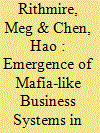

|
|
|
|
|
| Summary/Abstract |
A large body of literature on state–business relations in China has examined the political role of capitalists and collusion between the state and the private sector. This paper contributes to that literature and understanding of the internal differentiation among China's business elites by documenting the emergence of a particular kind of large, non-state business group that we argue is more akin to a mafia system than any standard definition of a firm. Drawing on large-N descriptive data as well as deep ethnographic and documentary research, we argue that mafia-like business systems share organizational principles (plunder and obfuscation) and means of growth and survival (relations of mutual endangerment and manipulation of the financial system). Understanding the particular moral economy that underlies mafia-like business systems and their interactions with the state challenges methodological foundations of research on China's political economy and helps to explain recent conflict between high-profile business people and the state.
|
|
|
|
|
|
|
|
|
|
|
|
|
|
|
|
| 2 |
ID:
183236
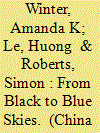

|
|
|
|
|
| Summary/Abstract |
This paper explores the perception and politics of air pollution in Shanghai. We present a qualitative case study based on a literature review of relevant policies and research on civil society and air pollution, in dialogue with air quality indexes and field research data. We engage with the concept of China's authoritarian environmentalism and the political context of ecological civilization. We find that discussions about air pollution are often placed in a frame that is both locally temporal (environment) and internationally developmentalist (economy). We raise questions from an example of three applications with different presentations of air quality index measures for the same time and place. This example and frame highlight the central role and connection between technology, data and evidence, and pollution visibility in the case of the perception of air pollution. Our findings then point to two gaps in authoritarian environmentalism research, revealing a need to better understand (1) the role of technology within this governance context, and (2) the tensions created from this non-participatory approach with ecological civilization, which calls for civil society participation.
|
|
|
|
|
|
|
|
|
|
|
|
|
|
|
|
| 3 |
ID:
183231
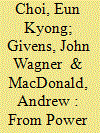

|
|
|
|
|
| Summary/Abstract |
Many China watchers argue that Xi Jinping has concentrated power in his own hands in a manner unprecedented since the death of Mao Zedong and Deng Xiaoping. This article tests the extent of Xi's power consolidation by comparing the strength of his faction during his time in power to similar periods under his two immediate predecessors, Jiang Zemin and Hu Jintao. Furthermore, we investigate whether a dominant faction is emerging under Xi Jinping, replacing the power balancing between factions that was the norm throughout the reform era. Analysing factional affiliations of Chinese leaders in the top four ranks, we find that Xi has formed a dominant faction. Through statistical analysis of the promotion chances of provincial leaders, we find that Xi has been unusually successful when compared to previous leaders at promoting his clients. This suggests that Xi has boosted the power of his faction by elevating provincial leaders to an extent not seen since the death of Mao and Deng.
|
|
|
|
|
|
|
|
|
|
|
|
|
|
|
|
| 4 |
ID:
183243


|
|
|
|
|
| Summary/Abstract |
Wildlife trade policies in China and elsewhere have come under increased scrutiny following suggestions that the emergence of the coronavirus SARS-CoV-2 may have been linked to trade in wild animals. The breeding of and trade in most terrestrial wild animal species for consumption as food were prohibited in China in February 2020, but trade for non-food purposes such as ornamental items or traditional medicine continues to be covered by provisions in the Wildlife Protection Law (WPL). While a superficial reading of the WPL could lead to the conclusion that commercial trade in nationally protected species is generally prohibited, in practice key language is interpreted to permit commercial trade in the parts and derivatives of protected wild animal species, including those subject to the most stringent protection within China and internationally, such as leopards and pangolins.
|
|
|
|
|
|
|
|
|
|
|
|
|
|
|
|
| 5 |
ID:
183238
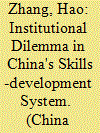

|
|
|
|
|
| Summary/Abstract |
The Chinese government has placed workforce upskilling at the core of its reform agenda to sustain the Chinese “economic miracle.” As such, the Ministry of Human Resources and Social Security (MOHRSS) and Ministry of Education (MOE) have each launched separate apprenticeship reforms geared towards enhancing China's oft-criticized vocational education and training system. Using a self-constructed theoretical framework, this article examines the two reforms and ascribes their divergent outcomes to the two ministries’ distinct approaches to institutionalizing their central initiatives (i.e. the top-down model followed by the MOHRSS versus the collaborative model of the MOE). However, given the absence of industry-level civil society governance in China, neither of these models has delivered ideal training outcomes, although the collaborative model has satisfied more employers and apprentices. China's skills-development reforms have thus become trapped in an institutional dilemma which is likely to impede the long-term economic restructuring efforts of the central state.
|
|
|
|
|
|
|
|
|
|
|
|
|
|
|
|
| 6 |
ID:
183241
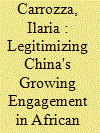

|
|
|
|
|
| Summary/Abstract |
Peace and security were once marginal in Sino-African relations. Recently, however, reflecting China's more proactive role as a global security actor, they have become central. Yet while China's actions mirror this shift, the official China–Africa discourse has not changed. This article, based on fieldwork interviews and discourse analysis of official Forum on China–Africa Cooperation (FOCAC) documents, proposes a theoretically grounded study of China's Africa discourse to account for the role it plays in maintaining continuity through time. It makes a threefold claim. First, while the China–Africa discourse has not been given much attention in the literature, it is crucial to explaining the overall success of China's engagement in the continent. Second, the shift in China's policies towards greater participation in peace and security is not mirrored by changes in the official discourse. Third, and related, this is owing mostly to the successful articulation of the link between the promotion of economic growth and the achievement of stability – the security–development nexus – and to the generally positive reception the discourse has found among African leaders.
|
|
|
|
|
|
|
|
|
|
|
|
|
|
|
|
| 7 |
ID:
183232
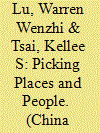

|
|
|
|
|
| Summary/Abstract |
China's political system has been characterized by two institutions since the 1980s: an explicit “layer-by-layer administrative hierarchy” and the “appointment of cadres one level down.” There have, however, been two departures from these administrative practices. First, some provinces have “empowered prosperous counties” by placing them in a dual-reporting relationship with both prefecture-level cities and provinces. Second, some provinces have restored personnel control going “two levels down” by appointing key officials at the county and urban district levels of government. These deviations evolved as responses to China's GDP-centric policy environment during the early reform era. Based on field interviews and nationwide analysis of city-level personnel data, this article argues that such adaptations have generated unintended conflicts between provinces and prefecture-level cities. While prior studies of evolutionary change in China highlight the relationship between state and non-state actors, this study demonstrates how interactions among state actors themselves may fundamentally transform the dynamics of administrative governance.
|
|
|
|
|
|
|
|
|
|
|
|
|
|
|
|
| 8 |
ID:
183240
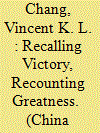

|
|
|
|
|
| Summary/Abstract |
The recent surge in public remembrance of the Second World War in China has been substantially undergirded by a centrally planned and systematically implemented discursive shift which has remained overlooked in the literature. This study examines the revised official narrative by drawing on three cases from China's school curriculum, museums and formal diplomacy. It finds that the once dominant trope of “national victimization” no longer represents the main thrust in the Chinese Communist Party's (CCP) rhetoric on the Second World War. Under Xi Jinping, this has been replaced by a self-assertive and aspirational narrative of “national victory” and “national greatness,” designed to enhance Beijing's legitimacy and advance its domestic and foreign policy objectives. By emphasizing national unity and CCP–KMT cooperation, the new narrative offers an inclusive and unifying interpretation of China's war effort in which the victory in 1945 has come to rival the 1949 revolution as the critical turning point towards “national rejuvenation.” The increasingly Sino-centric and centrally controlled narrative holds implicit warnings to those challenging Beijing's claim to greatness.
|
|
|
|
|
|
|
|
|
|
|
|
|
|
|
|
| 9 |
ID:
183242
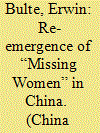

|
|
|
|
|
| Summary/Abstract |
Empirical evidence suggests that close to 100 million women are “missing” worldwide. We revisit the empirical evidence for China, the country with the most missing women. Nearly ten million girls born in the 1980s and 1990s who were “missing” according to earlier census data can be found again in the 2010 population census. We discuss two possible explanations for the re-emergence of these formerly missing girls: the delayed registration of girls owing to economic reasons, and the response to amendments to the Chinese Statistics Law in 2009 and policy changes in the 2010 population census. Using the most recent statistics, we document patterns of the underreporting of women over time and across regions as well as explore the basic determinants of underreporting of women. Important policy challenges remain. For the unregistered children, the lack of access to public services will increase their vulnerability and adversely affect their quality of life.
|
|
|
|
|
|
|
|
|
|
|
|
|
|
|
|
| 10 |
ID:
183233


|
|
|
|
|
| Summary/Abstract |
It is widely assumed that authoritarian states tend to use repression to suffocate social conflicts that threaten regime stability. Focusing on the Chinese state's responses to resource conflict, a particular type of social conflict triggered by mineral resource extraction, this research argues that authoritarian regimes may prefer to use redistributive policies to defuse social unrest under certain circumstances. Through mixed methods combining qualitative research and statistical analysis, I find that local governments in resource-rich regions do not spend heavily on coercive state apparatus. Instead, they generously hand out social security benefits to appease aggrieved citizens. Furthermore, the Chinese state actively involves mining companies in the redistribution process and requires them to share the financial costs of relief policies. Therefore, when conflicts arise between specific social groups with conflicting interests, redistribution may be a more effective strategy to preserve regime stability.
|
|
|
|
|
|
|
|
|
|
|
|
|
|
|
|
| 11 |
ID:
183237
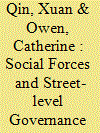

|
|
|
|
|
| Summary/Abstract |
This article interrogates the operating logic of China's street-level regulatory state, demonstrating that residents’ committees (RCs) assume a role as regulatory intermediaries to enhance the efficiency of local governance. Using Shanghai's new recycling regulations as a case study, it explores the mechanisms by which RCs elicit not only citizens’ compliance but also active participation. We show that the central mechanisms derive from the RCs’ skilful mobilization of particular social forces, namely mianzi and guanxi, which are produced within close-knit social networks inside Shanghai's housing estates (xiaoqu). We advance three arguments in the study of China's emerging regulatory state. First, we show how informal social forces are employed in regulatory governance at the street level, combining authoritarian control with grassroots participation. Second, the focus on RCs as regulatory intermediaries reveals the important role played by these street-level administrative units in policy implementation. Third, we suggest that the RCs’ harnessing of informal social forces is essential not only for successful policy implementation at street level but also for the production of the local state's political legitimacy.
|
|
|
|
|
|
|
|
|
|
|
|
|
|
|
|
| 12 |
ID:
183239


|
|
|
|
|
| Summary/Abstract |
In recent years, domestic tourism into the Xinjiang region of China has grown rapidly. Government officials view tourism as a source of both economic capital and social stability, presenting a normalcy that makes it attractive for investment. There are two paradoxes to Xinjiang tourism. According to most literature, a massive military presence should deter tourists, but numbers have continued to grow in the militarized Xinjiang region. Second, the cultural “otherness” of Xinjiang is a big draw to the region, yet this culture is being suppressed by state policies to contain Islam. Using a dataset of Han Chinese travel diaries, I look at how narrated tourist experiences of Xinjiang justify policing, how ethnic boundaries are reinforced by practices in both transportation and personal interaction, and how state policies influence Chinese travellers’ views on the authenticity of their experience. While bodily assurances of security substantiate political legitimacy, tourists resist the bureaucratic management of sites, allowing for critiques focused almost exclusively on aesthetic taste.
|
|
|
|
|
|
|
|
|
|
|
|
|
|
|
|
| 13 |
ID:
183234
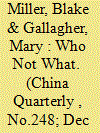

|
|
|
|
|
| Summary/Abstract |
In this paper, we examine how the Chinese state controls social media. While social media companies are responsible for censoring their platforms, they also selectively report certain users to the government. This article focuses on understanding the logic behind media platforms’ decisions to report users or content to the government. We find that content is less relevant than commonly thought. Information control efforts often focus on who is posting rather than on what they are posting. The state permits open discussion and debate on social media while controlling and managing influential social forces that may challenge the party-state's hegemonic position. We build on Schurmann's “ideology and organization,” emphasizing the Party's goals of embedding itself in all social structures and limiting the ability of non-Party individuals, networks or groups to carve out a separate space for leadership and social status. In the virtual public sphere, the Chinese Communist Party (CCP) continues to apply these principles to co-opt, repress and limit the reach of influential non-Party “thought leaders.” We find evidence to support this logic through qualitative and quantitative analysis of leaked censorship documents from a social media company and government documents on information control.
|
|
|
|
|
|
|
|
|
|
|
|
|
|
|
|
|
|
|
|
|